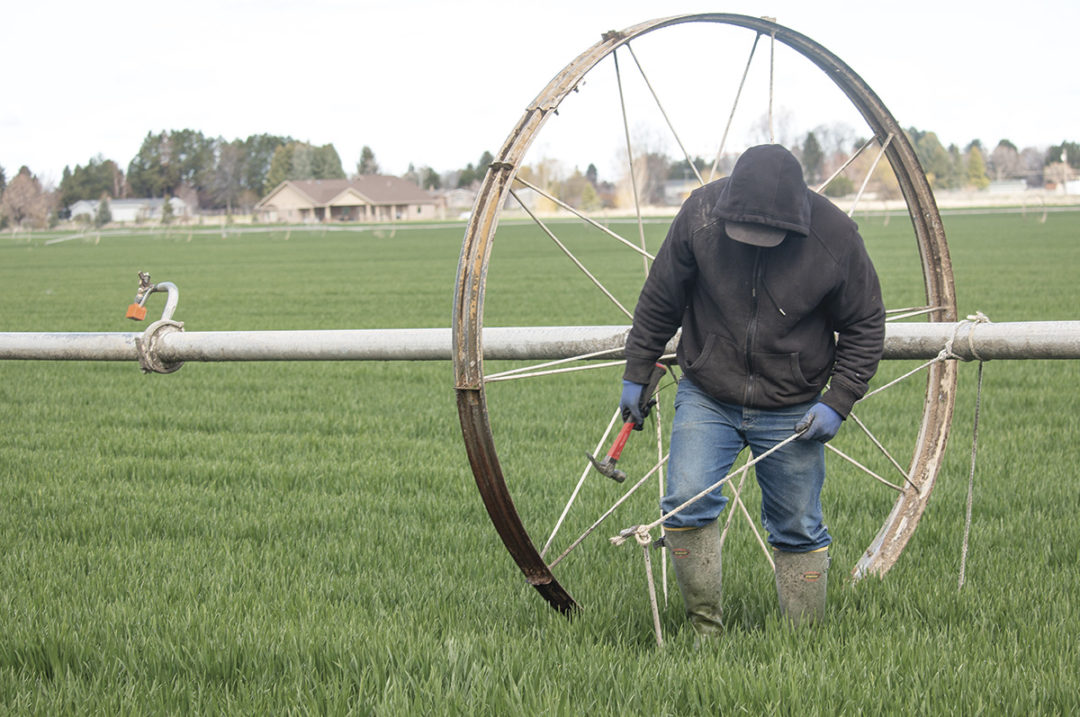Recently, the results of a Hispanic labor survey – Money Doesn’t Always Matter, Low Cost Ways to Increase the Longevity of Southern Idaho’s Hispanic Agricultural Employees – was published in the Journal of the National Association of County Agricultural Agents. Jason Thomas and Joel Packham, extension educators for the University of Idaho; and Nav Ghimire, associate director of UI extension, were contributors.
According to the Idaho Department of Labor’s Agricultural Employment Estimates in 2020, the top five counties by employment were Canyon, Bingham, Jerome, Twin Falls and Cassia. “One of the challenges farmers in the Mini-Cassia area have brought to our attention is the fact that many farmers struggle to maintain their Hispanic workers long-term,” said Thomas. “This raised the question as to why some of the workers in this group changed jobs so frequently. Researchers with the University of Idaho decided to investigate this further. From our visits with farmers, most of them felt that salary was the most important factor. In other words, whoever offered the most pay was going to get and keep the workers. To test this, we developed a survey asking what benefits and work conditions were most likely to influence Hispanic workers to change jobs or stay in the same position.”
The highest-ranked factor influencing worker longevity was being offered trainings to learn new things. “The second- and fourth-most-important factors to employees were how they were treated by the owner of the company and how they were treated by their boss,” reported the journal. Health insurance was the third factor, while salary was the fifth factor. “Our results suggest that an affordable way to increase the longevity of the employment of these workers is ensuring they are treated well and offering ongoing trainings.”
According to a 2018 survey, 64% of all farm laborers, graders and sorters are Hispanic; most originating from Mexico. As a major agricultural state, Idaho utilizes many Hispanic employees to support the agricultural industries of the state. The contribution of this group varies from year to year but, in 2016, migrant and seasonal farm employees accounted for 39% of farm employees in Idaho.
Thomas said, “The survey was delivered in person on paper. We have found that this group responds better to physical surveys than digital, deployed via cellphone. These were all on paper and translated into Spanish by Mario de Har Marti and myself, who are both fluent in Spanish and English. Participants were explained [to] what the purpose of the survey was in Spanish and walked through the survey to help them understand the questions.”
The survey was launched between December 2018 and March 2019, and were implemented in Pocatello, Mountain Home and Caldwell. To increase participation, a raffle for gift cards was held at each training for a randomly selected participant.
“I know 158 participants is not a huge percent of the total labor force, but it gives us an idea of what some of the workers feel. No other surveys of this type have been deployed in Idaho, so it is better than nothing. It is probably just a bit under 1% of total Hispanic workers in the state. There are other extension trainings held for Hispanic laborers, and some attend training in English, but that’s not an easy number to get a hold of, at least to my knowledge,” said Thomas.
He said, “The list is not meant to be all-inclusive, and I don’t proclaim to be a psychologist or an expert on human resources. Every worker wants to be treated differently.”
Low-cost ways to increase the longevity of your workers include:
1. Let local partners like the University of Idaho Extension know you are interested in training your Hispanic workforce. Most Spanish-speaking educators enjoy training in Spanish, but getting workers to come out can be a challenge if managers are not willing to pay or require their workers to come. Sure, Thomas said, it might cost money to pay their hourly wage to come to a training, but survey results suggest these types of trainings make workers feel more valued and stay longer.
2. Put on your own trainings to teach your workers new skills, like how to identify insects, weeds or diseases in your crops or livestock. By helping your workers understand these principles, they can contribute to the operation and welfare of the crops or livestock. This can help them feel more invested.
3. For bigger operations, at the least, learn the names of all the workers, including the new ones who just arrived. If you already know everyone’s name, take the time to learn a thing or two about the workers and their families. In my personal life, Thomas said, I really appreciate it when people remember the names of my kids or ask about them and how they are doing.
4. Ask workers how they feel about working conditions, the way they are treated, new skills they would like to learn. This could be done in a short interview or in a simple survey. Make sure they feel comfortable sharing this information so you can get an honest response.
In conclusion, the report stated, “Our results show this group of employees is very comfortable carrying out difficult labors including repetitive tasks, working long hours, carrying out physically demanding labor and working late at night or early in the morning. Three of the most important factors are related to how they are treated as individuals. Our data suggests that operations could benefit from helping their employees feel more valued by increasing their skills and knowledge and by working to make supervisors and owners more conscious of how their employees are treated. Doing so may increase the longevity of employment, creating a successful long-term team; otherwise, workers may look for a place where they feel more welcomed and valued beyond their salary.”





